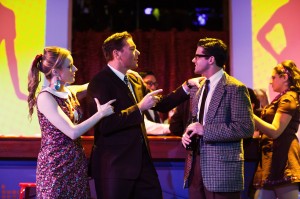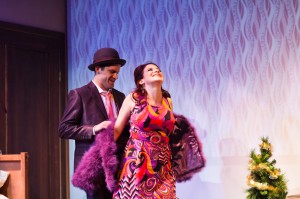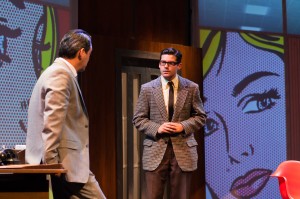PROMISING PROMISES, I PROMISE
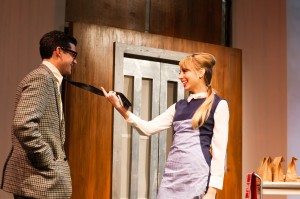 The premise of Promises, Promises is one you are probably familiar with even if you have never seen the 1968 musical, which opens in a splashy revival at San Francisco Playhouse this week. An ambitious junior executive, Chuck Baxter, wants to move up the corporate ladder. In return for promises of a promotion, he allows the higher-ups to use his apartment for trysts’”and not with their wives. The romance arrives via a waitress from the company cafeteria, and the conflict comes from the Big Honcho, personnel director J.D. Sheldrake, the company’s commanding personnel director who wants the pad for his very own.
The premise of Promises, Promises is one you are probably familiar with even if you have never seen the 1968 musical, which opens in a splashy revival at San Francisco Playhouse this week. An ambitious junior executive, Chuck Baxter, wants to move up the corporate ladder. In return for promises of a promotion, he allows the higher-ups to use his apartment for trysts’”and not with their wives. The romance arrives via a waitress from the company cafeteria, and the conflict comes from the Big Honcho, personnel director J.D. Sheldrake, the company’s commanding personnel director who wants the pad for his very own.
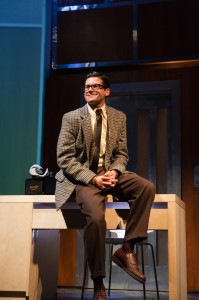 It is, of course, the plot line of The Apartment, written by Billy Wilder and I. A. L. Diamond, a 1961 hit that won Oscars for Best Picture, Director, and Original Screenplay. While the movie-to-musical phenomenon is currently ubiquitous, the trend of adapting movies into musicals was practically unheard of in 1968; rather, Hollywood still looked to Broadway for inspiration.
It is, of course, the plot line of The Apartment, written by Billy Wilder and I. A. L. Diamond, a 1961 hit that won Oscars for Best Picture, Director, and Original Screenplay. While the movie-to-musical phenomenon is currently ubiquitous, the trend of adapting movies into musicals was practically unheard of in 1968; rather, Hollywood still looked to Broadway for inspiration.
It all started with Bob Fosse and Neil Simon. Having collaborated on Little Me (1962) and Sweet Charity (1966), the two turned to Broadway’s most successful producer. David Merrick, a.k.a. “The Abominable Showman,” agreed with Simon’s idea to musicalize The Apartment, and since Merrick hadn’t produced a blockbuster since Hello, Dolly! (1964), he jumped at the chance, and immediately obtained the rights to Wilder’s comedy-drama (it didn’t hurt that Simon and Fosse were the hottest properties on Broadway). The most important thing about Promises’”written by Simon in a neat combination of hilarity and heart’”is that it was, and remains, excruciatingly funny.
The next decision profoundly affected the way new musicals are written today. While The Apartment was a mix of cynicism, sentiment, and bittersweet humor, Simon decided that a musical should be lighter and more comic. “I don’t think I write happy endings,” Simon wrote. “I try never to end a play with two people in each other’s arms’”unless it’s a musical.” Simon somehow knew that the pop songwriting duo of Burt Bacharach (music) and Hal David (lyrics), neither of whom had ever written for Broadway (and haven’t since*), would be perfect collaborators for such a musical. Fortunately, Merrick had already been eyeing the composers of “Walk on By,” “Close to You,” and “What’s New Pussycat?” (and dozens of other hits), so he met David at the Beverly Hills Hotel and told him this was it.
Influenced by his background in jazz harmony, Bacharach wrote music characterized by unusual chord progressions, striking syncopated rhythmic patterns, irregular phrasing, frequent modulation, and odd, changing meters. Much of this can be found in Promises, Promises. While the score is a bit too perky and not quite memorable, it is peppy, melodic, and contemporary. It also introduced audiences to “I’ll Never Fall in Love Again” and “Knowing When to Leave,” both recorded by Bacharach/David-regular Dionne Warwick.
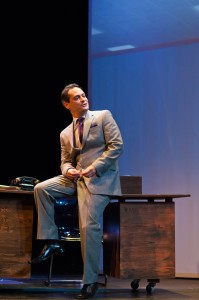 At the time, the presence of pop music in the theater was startlingly refreshing, which is why SF Playhouse director Bill English is wise to not update the musical; he is infusing it with the swinging energy of 1968 Manhattan, not unlike Mad Men. (David Möschler and Kevin Roland direct the music, and Kimberly Richards choreographs.)
At the time, the presence of pop music in the theater was startlingly refreshing, which is why SF Playhouse director Bill English is wise to not update the musical; he is infusing it with the swinging energy of 1968 Manhattan, not unlike Mad Men. (David Möschler and Kevin Roland direct the music, and Kimberly Richards choreographs.)
Hal David’s bright and tricky lyrics surprised everyone, but he instinctively knew what would work: “The songs had to tell the story as well as the book does,” David said in an interview with Masterworks Broadway. “I mean, the book couldn’t stop every so often for a song to go in, and then continue on. Those days were long over by the time we got around to doing a show. And trying to use the same language that the book writer did, so it had a seamless feeling, didn’t turn out to be so difficult’¦ I found a lot of ideas in Neil’s script, and phrases or more important parts of a scene would suddenly become a song. Then you wouldn’t need that part of the scene anymore.” (Are you listening modern pop-turned-Broadway writers Cyndi Lauper, Trey Anastasio, Bono, and Glen Ballard?)
Six months before rehearsals were to begin, Fosse’”immersed in filming Sweet Charity with Shirley MacLaine’”dropped out. After Hal Prince turned down Merrick’s offer to direct, the job went to Robert Moore, who had appeared in Merrick’s 1965 comedy hit Cactus Flower before turning director in April 1968 with the astoundingly successful Off-Broadway-smash The Boys in the Band. The chosen choreographer was Michael Bennett, who had only worked on flops, either as dancemaker or show doctor; but Merrick knew talent when he saw it (Bennett would go on to helm Company, Follies, A Chorus Line, and Dreamgirls).
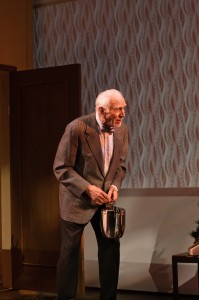 The methods used by Bacharach and orchestrator Jonathan Tunick to bring “recording studio sound” into the theater’”electronic instruments, carefully calibrated miking, and vocalizing backup voices (“pit singers”) for sweetening’”made vast and immediate changes in Broadway music (the theater’s sound system was designed was by Phil Ramone). If these innovations served to enhance the rhythms of Promises, they were used to far-reaching effect in Tunick’s next show, Company (1970).
The methods used by Bacharach and orchestrator Jonathan Tunick to bring “recording studio sound” into the theater’”electronic instruments, carefully calibrated miking, and vocalizing backup voices (“pit singers”) for sweetening’”made vast and immediate changes in Broadway music (the theater’s sound system was designed was by Phil Ramone). If these innovations served to enhance the rhythms of Promises, they were used to far-reaching effect in Tunick’s next show, Company (1970).
Still, the overall ebullience of the well-made Promises (which ran for 1,281 performances) remains in its score and book. Critic John Lahr wrote, “It is a sort of accessible irony-free, pre-Sondheim production, in which the big heart still dominates over the atrophied one.” It naturally contains some dated attitudes toward romantic and workplace relationships, but the excellent Playhouse’”whose recent production of Into the Woods offered some of the clearest storytelling of that Sondheim musical’”is set to get this one just right.
* In 2011, Bacharach took a crack at a musical, Some Lovers, with Spring Awakening‘s Steven Sater.
photos by Jessica Palopoli
 Promises, Promises
Promises, Promises
San Francisco Playhouse
Kensington Park Hotel, 450 Post Street
Tues-Thurs at 7, Fri at 8;
Sat at 3 & 8; Sun at 2
no shows on Nov 27, Dec 24, 25 or Jan 1
plays through January 10, 2015
for tickets, call 415-677-9596
or visit www.sfplayhouse.org

